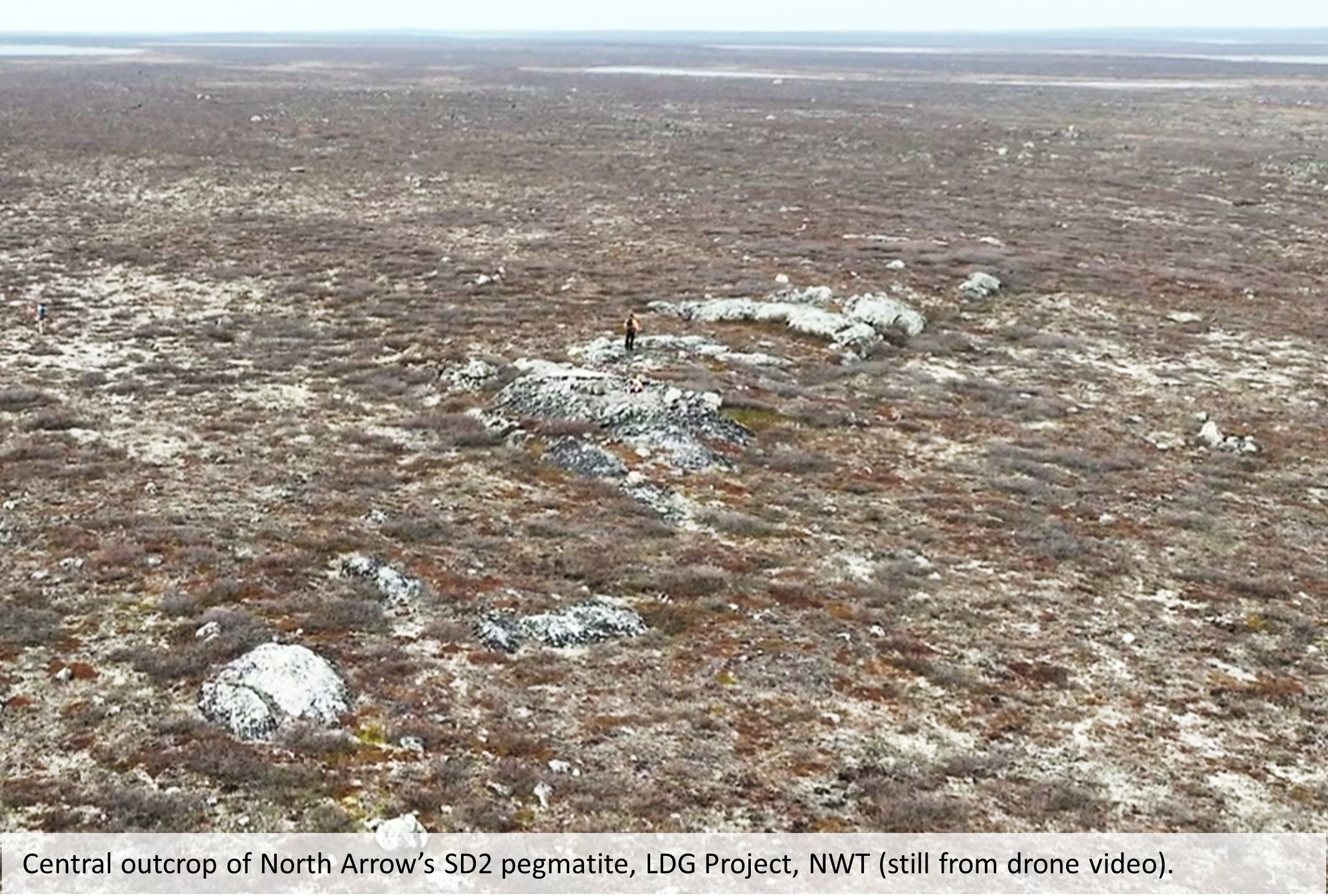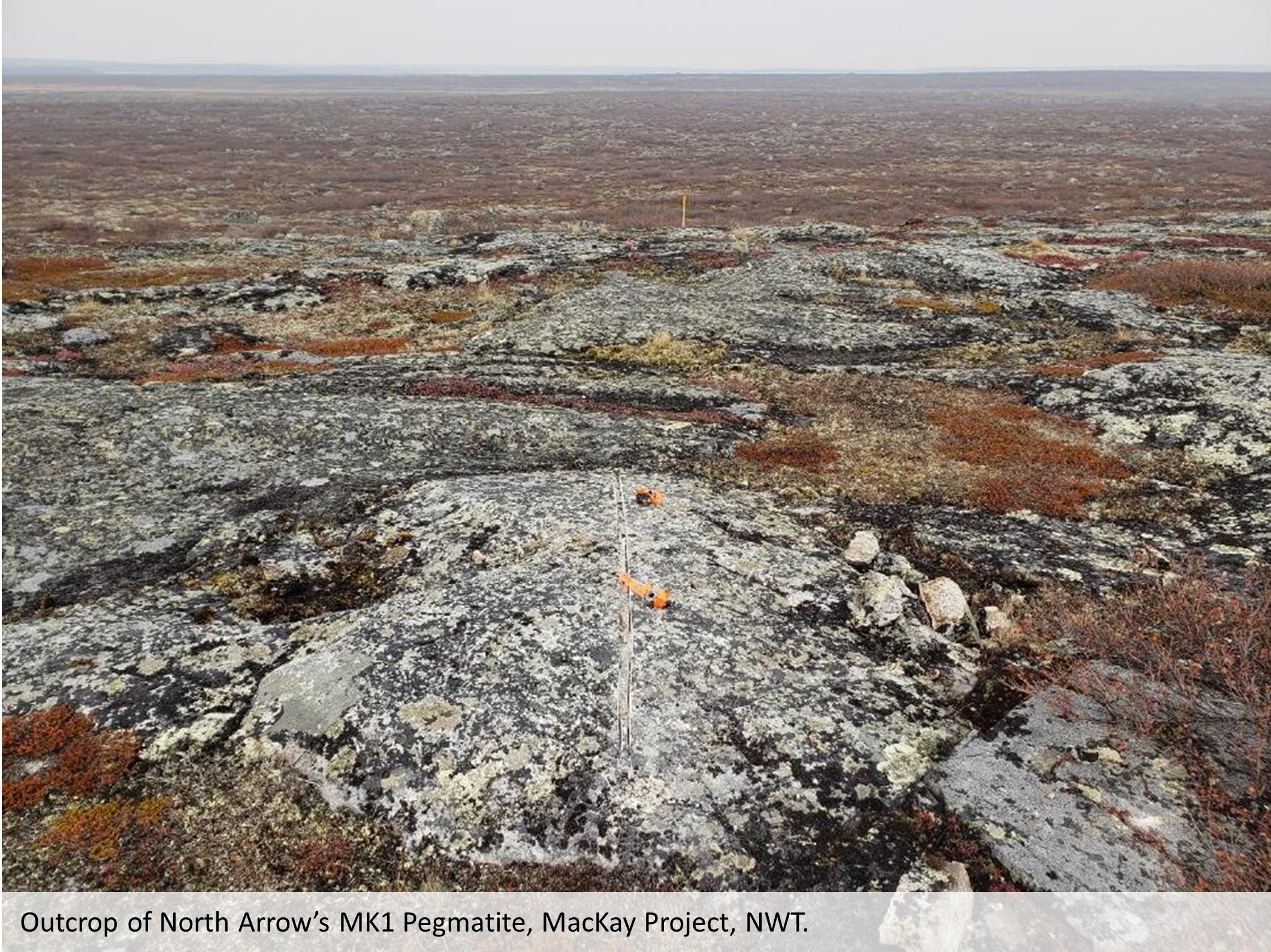North Arrow Minerals Targets Lithium in Northwest Territories
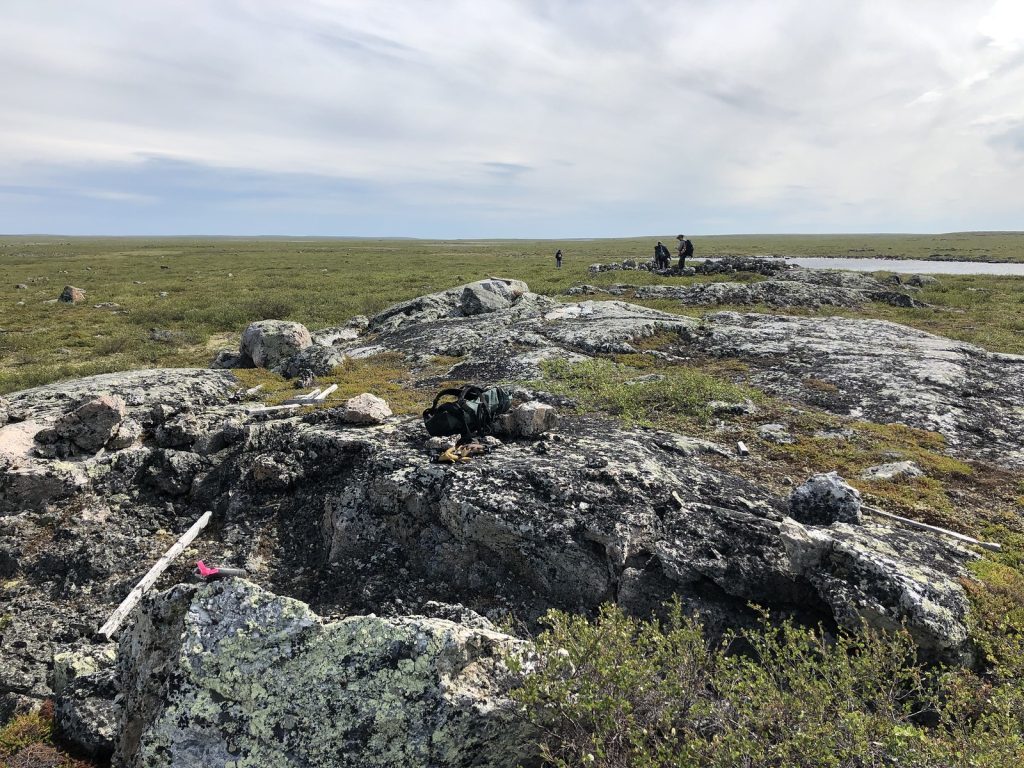
By Peter Kennedy
The global push to find new sources of lithium has moved to Canada’s Northwest Territories, where some of the exploration activity is occurring in the shadow of the region’s prolific diamond mines.
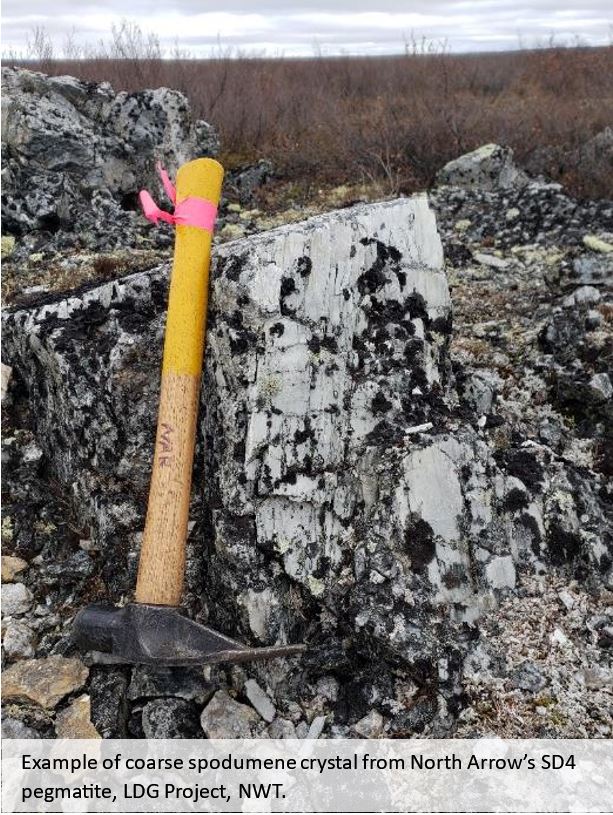 In recent months, geologists searching for lithium have focused on the Yellowknife Pegmatite Province (YPP), an area east of the city of Yellowknife that is known to contain numerous spodumene-bearing pegmatites (spodumene is an important lithium-bearing mineral), the biggest of which are exposed on surface and large enough to be visible on satellite imagery.
In recent months, geologists searching for lithium have focused on the Yellowknife Pegmatite Province (YPP), an area east of the city of Yellowknife that is known to contain numerous spodumene-bearing pegmatites (spodumene is an important lithium-bearing mineral), the biggest of which are exposed on surface and large enough to be visible on satellite imagery.
These types of formations are one of the main sources for the commercial extraction of lithium, a key ingredient in the production of electric vehicle batteries. Lithium mineralization hosted in spodumene-bearing pegmatites of the YPP was first discovered in the 1940s and intermittently explored until the 1980s.
Among the early pioneers in the YPP area was Canadian Superior Exploration which published a back of the envelope mineral inventory of 49 million tons at 1.40% Li20.
Although this estimate would not meet modern disclosure requirements, it provides sufficient encouragement for a number of companies, buoyed by strong investor interest in lithium, to pick up ground and recommence exploration in the YPP, including Midas Metals, Loyal Lithium with Patriot Battery Minerals and North Arrow Minerals Inc. [NAR-TSXV]
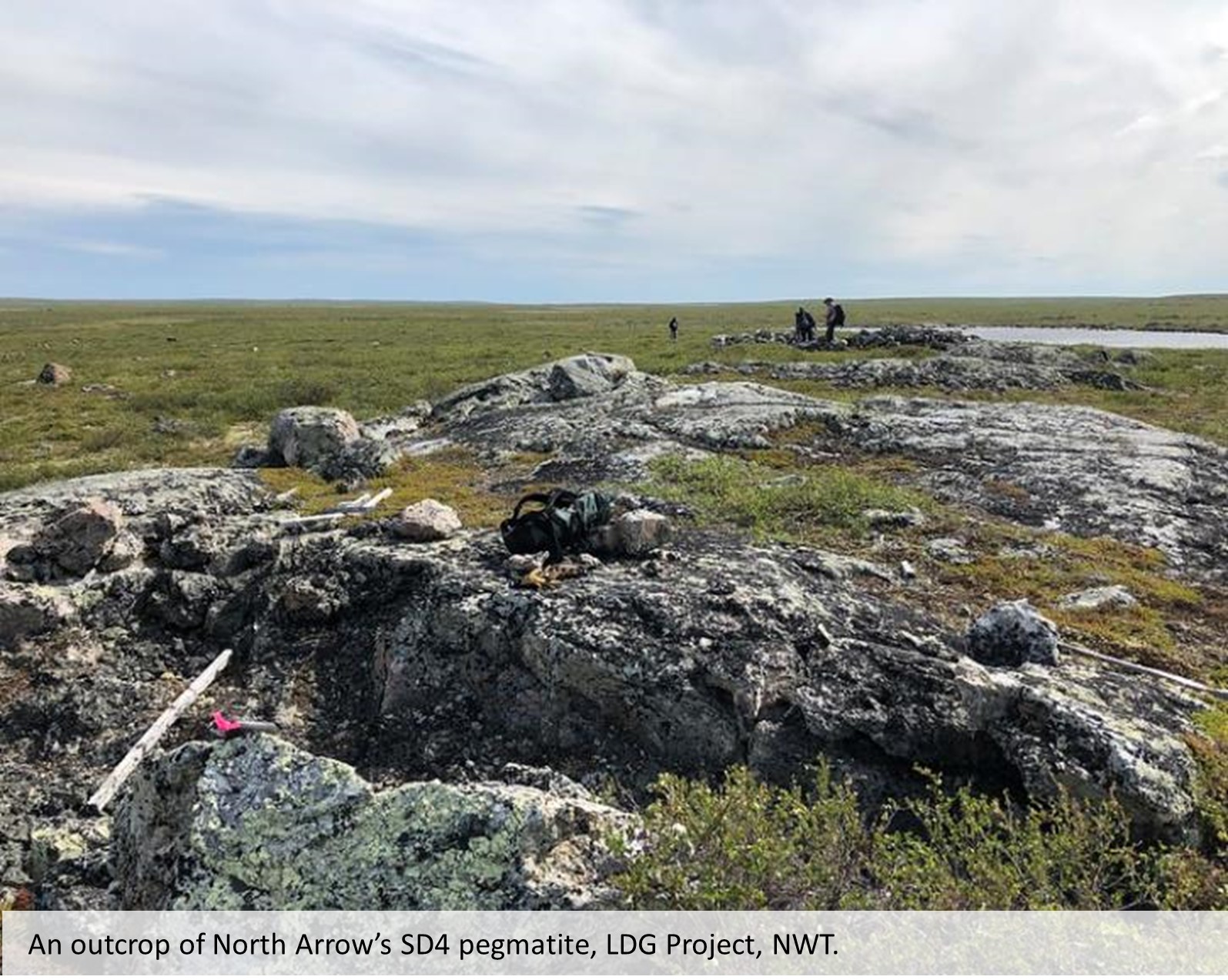 Li-FT is currently drilling many of the pegmatites that were explored by Canadian Superior in a bid to verify and expand historic results and define a resource estimate that meets modern NI 43-101 standards of disclosure on its Yellowknife Lithium Project.
Li-FT is currently drilling many of the pegmatites that were explored by Canadian Superior in a bid to verify and expand historic results and define a resource estimate that meets modern NI 43-101 standards of disclosure on its Yellowknife Lithium Project.
“One of the most incredible things about this project is that there is nearly 100% outcropping exposure of these pegmatites,” said Li-FT CEO Francis MacDonald.
Decade old forest fire activity in the area has served to assist the work of geologists by removing vegetation that previously covered the pegmatites, which are a bright white colour and intrude into the gray sedimentary rocks.
North Arrow is also aiming to capitalize on investor interest in lithium by evaluating spodumene pegmatites at its 100%-owned DeStaffany, LDG and MacKay lithium projects in the Northwest Territories.
 North Arrow is led by President and CEO Ken Armstrong, a geologist and veteran of 27 years in mineral exploration. He is the current past President of the Northwest Territories & Nunavut Chamber of Mines and has been involved in lithium, gold, nickel, and diamond exploration mainly in Canada’s north. Early in his career Ken was involved in the initial resource modelling for the Diavik Diamond Mine, which is where he first met North Arrow’s Chairman, Grenville Thomas.
North Arrow is led by President and CEO Ken Armstrong, a geologist and veteran of 27 years in mineral exploration. He is the current past President of the Northwest Territories & Nunavut Chamber of Mines and has been involved in lithium, gold, nickel, and diamond exploration mainly in Canada’s north. Early in his career Ken was involved in the initial resource modelling for the Diavik Diamond Mine, which is where he first met North Arrow’s Chairman, Grenville Thomas.
Grenville’s track record of success includes the discovery of multiple deposits including two operating mines in the Northwest Territories, a region he has been exploring since the late 1960s. In the 1970’s, his first public company Highwood Resources, discovered the Thor Lake rare earth deposit, now the Nechalacho Rare Earth Mine, and in the early 1990s, he was CEO of Aber Resources when it discovered Diavik.
Recognizing that the market will reward companies who can show a quick pathway to production, North Arrow is focused on what Armstrong believes could be a very large spodumene pegmatite field on the LDG project, covering over 145,000 hectares near Lac de Gras and from which the Diavik wind farm is clearly visible on the horizon.
 Diamonds were North Arrow’s original target at LDG, however, the focus switched to lithium earlier this year when the company ran across an old Geological Survey of Canada map indicating the presence of spodumene pegmatite showings on the property, within five kilometres of the winter road that services the Diavik and Ekati mines at Lac de Gras.
Diamonds were North Arrow’s original target at LDG, however, the focus switched to lithium earlier this year when the company ran across an old Geological Survey of Canada map indicating the presence of spodumene pegmatite showings on the property, within five kilometres of the winter road that services the Diavik and Ekati mines at Lac de Gras.
“We are focused on LDG because of the significant size potential that we see there,’’ he said during an interview with Resource World, “which we think could be on par with the spodumene pegmatite deposits being drilled around Yellowknife.”
In a September 18, 2023, press release, North Arrow announced initial lithium assays from spodumene pegmatites discovered in July at the LDG property, including five of seven representative grab samples from the SD4 spodumene pegmatite that returned from 1.10% Li20 to 2.17% Li20, and seven of eight rock sawn channel samples from the SD2 spodumene pegmatite that assayed from 0.40% Li20 to 1.70% Li20.
Based on mapping of low-relief outcrop exposures, North Arrow interpreted the SD2 and SD4 exposures as near vertical feldspar-quartz-muscovite spodumene pegmatites, estimated at 10-20 metres wide and over 400 metres in length. The pegmatites are located approximately two kilometres apart and remain open below overburden and along strike.
Follow up field exploration is underway this fall, with work to include mapping, prospecting and ground magnetic surveys as well as spotting proposed drill holes ahead of a spring 2024 exploration drill program.
The LDG property covers an 18-kilometre prospective corridor of metasedimentary rocks. The pegmatites discovered by North Arrow intrude these metasediments, adjacent to a fertile two-mica granite very similar in age and setting to the host rocks of the spodumene pegmatites of the YPP. Less than seven kilometres of this under explored trend have been prospected to date and, in addition to SD2 and SD4, at least five other pegmatites, up to 50 metres wide, have been identified by North Arrow and require further mapping and sampling to understand their potential to host significant lithium mineralization.
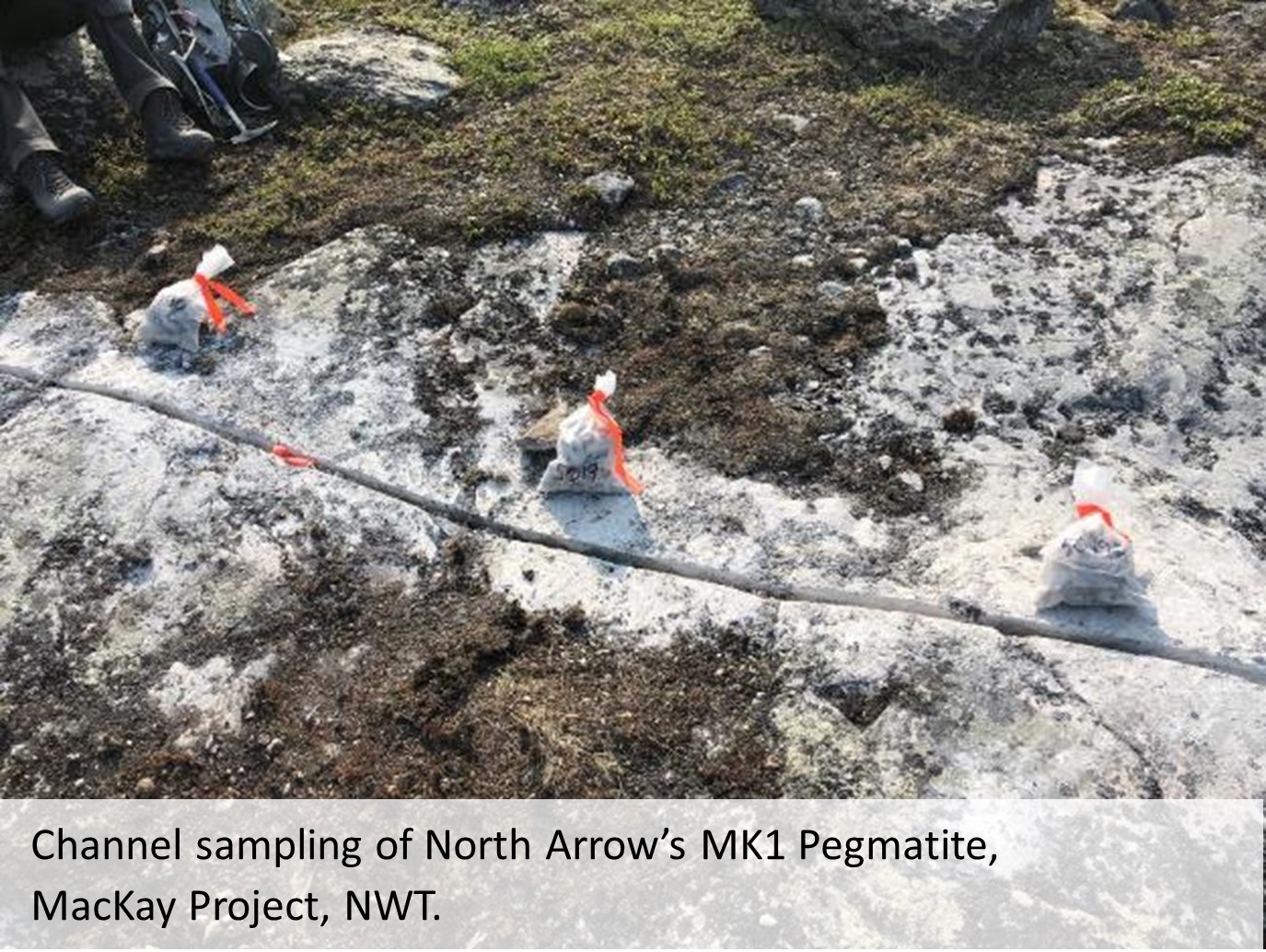 Meanwhile, in a press release on September 20, 2023, North Arrow announced new lithium assays from the company’s 100%-owned MacKay Lake property, located approximately 20 km south of LDG and also within a few kilometres of the winter road that services the diamond mines to the north.
Meanwhile, in a press release on September 20, 2023, North Arrow announced new lithium assays from the company’s 100%-owned MacKay Lake property, located approximately 20 km south of LDG and also within a few kilometres of the winter road that services the diamond mines to the north.
The company said six of eight rock sawn channel samples from the MK1 spodumene pegmatite discovered in June, 2023, had returned Li20 assay results of 1.16%, 1.34%, 1.87%, 1.90%, 1.93%, and 2.30%. These samples were collected over 1.0-metre intervals in July, 2023, and complement the assays of prospecting grab samples that returned 2.45% to 3.74% Li20, as reported in a North Arrow press release on August 14, 2023.
“The MK1 pegmatite lies within the same prospective metasedimentary rocks as the SD spodumene pegmatites located on the LDG property, approximately 20 kilometres to the north,’’ said Armstrong. He said the channel sample results confirm the potential of MK1 to host a significant new lithium discovery.
Beyond the MK1, the MacKay property covers an additional 14 kilometre length of this same prospective metasedimentary corridor identified at LDG.
“We believe the opportunity for additional discoveries of spodumene pegmatites is significant and a field program is presently underway on both the Mackay and LDG properties consisting of additional mapping, prospecting, sampling and ground geophysical surveys, ahead of drilling to be conducted in spring 2024.’’
North Arrow’s portfolio includes the DeStaffany project, located 115 kilometres east of Yellowknife, within the YPP, the same pegmatite province that is currently being assessed by Li-FT, Loyal Lithium, Midas Minerals and other explorers. DeStaffany contains four known lithium-tantalum-niobium-bearing pegmatites, including two discovered by North Arrow in June of this year.
On October 6, 2023, North Arrow shares closed at $0.04, leaving the company with a market cap of $7.0 million, based on 175 million shares outstanding (254.8 fully diluted). The shares are trading in a 52-week range of 12 cents and $0.03.
THIS IS NOT A RECOMMENDATION TO BUY OR SELL ANY SECURITY.

